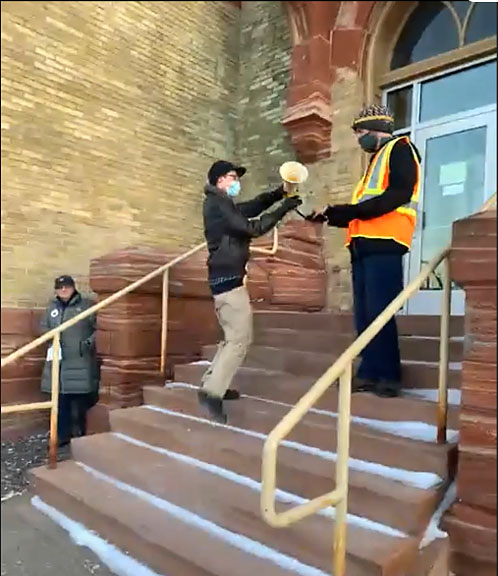By Scott Wendt, Michigan Tech Manager of Health and Safety, Environmental Health and Safety
Posted in Tech Today on March 3, 2020
HOUGHTON -- A community outbreak of the respiratory illness caused by a novel (new) coronavirus, COVID-19, has continued to spread to multiple countries. The U.S. Centers for Disease Control and Prevention (CDC) continues to closely monitor developments. At this time, the CDC has issued additional Level 3 Travel Health Notices for Italy and Iran. Currently, the CDC recommends travelers avoid all nonessential travel to the following countries: China, Iran, Italy, and South Korea.
Consistent with the CDC recommendation, Michigan Tech is issuing a University-wide travel restriction for Italy and Iran. Michigan Tech travel restrictions are also still in place for China and South Korea. The restriction applies to faculty, staff, and students. If you have essential travel scheduled to one of these countries, please contact the Office of General Counsel at 906-487-2318.
The University administration continues to monitor the situation for developments and will update the campus community as necessary. For Michigan-specific information on the coronavirus, please visit the Michigan Department of Health and Human Services webpage.
To get more information and view all updates from Michigan Tech, visit: mtu.edu/covid-19
Tuesday, March 03, 2020
Monday, March 02, 2020
U.S. Supreme Court to review Affordable Care Act decision that jeopardizes health care for millions
LANSING -- The U.S. Supreme Court today agreed to review a lower court’s decision that found the individual mandate of the Affordable Care Act (ACA) unconstitutional, at the urging of Michigan Attorney General Dana Nessel and 19 other attorneys general and the governor of Kentucky, who collectively filed the petition for review.
The Fifth Circuit Court of Appeals’ Dec. 18, 2019, decision in Texas v. U.S. held the ACA’s individual mandate -- requiring people to obtain health insurance coverage -- unconstitutional and called into question whether the remaining provisions of the ACA could still stand, including those that protect and provide coverage to Americans with pre-existing conditions.
"Though this decision fell short of an expedited review, I am pleased the Supreme Court will nonetheless review this case," Nessel said. "The Affordable Care Act provides essential protections for millions of Michiganders with pre-existing conditions. Ensuring those safeguards are maintained is critical to caring for our state’s residents as well as the health of our country."
Nessel and the coalition petitioned the Supreme Court to review the case because the lower court’s ruling causes uncertainty that may harm the health of millions of Americans, as well as doctors, clinics, patients and the health care market. The Supreme Court granted the coalition’s request but declined to expedite its review and consider the case by the end of the court’s current term in June as it was also asked to do.
The lawsuit was filed by a Texas-led coalition and supported by the Trump administration, which argued that Congress rendered the ACA’s individual mandate unconstitutional when it reduced the penalty to $0. They further argued that the rest of the ACA should be held invalid because of that change.
The Fifth Court determined the individual mandate was unconstitutional but declined to rule on the ACA’s remaining provisions, instead opting to send the case back to the Northern District of Texas to determine which provisions of the 900-page law were still valid. Those provisions include coverage for the 133 million Americans with pre-existing conditions, subsidies that help working families afford health care, investments in public health programs to prevent and combat public health threats like the opioid epidemic, and support lab capacity and immunization infrastructure for threats like novel coronavirus.
Unless the court orders otherwise, the case will be reviewed in October at the earliest.
Inset photo: Michigan Attorney General Dana Nessel. (Photo courtesy Michigan.gov)
The Fifth Circuit Court of Appeals’ Dec. 18, 2019, decision in Texas v. U.S. held the ACA’s individual mandate -- requiring people to obtain health insurance coverage -- unconstitutional and called into question whether the remaining provisions of the ACA could still stand, including those that protect and provide coverage to Americans with pre-existing conditions.
"Though this decision fell short of an expedited review, I am pleased the Supreme Court will nonetheless review this case," Nessel said. "The Affordable Care Act provides essential protections for millions of Michiganders with pre-existing conditions. Ensuring those safeguards are maintained is critical to caring for our state’s residents as well as the health of our country."
Nessel and the coalition petitioned the Supreme Court to review the case because the lower court’s ruling causes uncertainty that may harm the health of millions of Americans, as well as doctors, clinics, patients and the health care market. The Supreme Court granted the coalition’s request but declined to expedite its review and consider the case by the end of the court’s current term in June as it was also asked to do.
The lawsuit was filed by a Texas-led coalition and supported by the Trump administration, which argued that Congress rendered the ACA’s individual mandate unconstitutional when it reduced the penalty to $0. They further argued that the rest of the ACA should be held invalid because of that change.
The Fifth Court determined the individual mandate was unconstitutional but declined to rule on the ACA’s remaining provisions, instead opting to send the case back to the Northern District of Texas to determine which provisions of the 900-page law were still valid. Those provisions include coverage for the 133 million Americans with pre-existing conditions, subsidies that help working families afford health care, investments in public health programs to prevent and combat public health threats like the opioid epidemic, and support lab capacity and immunization infrastructure for threats like novel coronavirus.
Unless the court orders otherwise, the case will be reviewed in October at the earliest.
Inset photo: Michigan Attorney General Dana Nessel. (Photo courtesy Michigan.gov)
Subscribe to:
Posts (Atom)


































































































